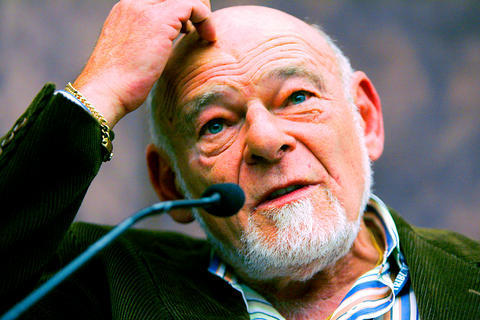On Thursday, after completing an US$8.2 billion deal that turned the Tribune Co into a privately held operation, Samuel Zell made himself chief executive, announced a new set of directors and managers, and declared that the troubled company would look to raise revenue more than cut spending.
At a press conference in Chicago, Zell, who has made billions in real estate, cheerfully upheld his reputation as a blunt, funny and contrary businessman.
He disparaged the conventional wisdom that the newspaper industry -- and the Tribune Co in particular -- was suffering through a long, unavoidable contraction, and repeatedly stated that Tribune could increase its revenues.

PHOTO: AP
"I'm sick and tired of listening to everybody talk about and commiserate about the end of newspapers," he said. "They ain't ended. And they're not going to be."
He said of Tribune: "I think it's a very low-risk investment, but this wouldn't be the first time that my opinion diverged from everybody else's."
The transaction makes Tribune a nonprofit organization owned entirely by an employee stock ownership plan, but Zell, who invested US$315 million in the deal, has the right to buy up to 40 percent of it in the future. Tribune owns The Chicago Tribune, The Los Angeles Times, Newsday, The Baltimore Sun and 23 television stations, among other properties.
The company added five members to its board on Thursday, replacing four departing directors. Three others remain, including Zell, the new chairman. Most of the newcomers have long experience in communications, but not in Tribune's core industries of television and newspapers.
"This is not a board where we have to have people on it who are going to impress Wall Street," Zell said. "They tend to be non-conventional thinkers."
One new director is Brian Greenspun, who heads his family's investment company, the Greenspun Corp, which made an unspecified investment in Tribune. The corporation owns several publications, including The Las Vegas Sun, where Greenspun is the editor.

Japanese Prime Minister Sanae Takaichi yesterday lavished US President Donald Trump with praise and vows of a “golden age” of ties on his visit to Tokyo, before inking a deal with Washington aimed at securing critical minerals. Takaichi — Japan’s first female prime minister — pulled out all the stops for Trump in her opening test on the international stage and even announced that she would nominate him for a Nobel Peace Prize, the White House said. Trump has become increasingly focused on the Nobel since his return to power in January and claims to have ended several conflicts around the world,

UKRAINE, NVIDIA: The US leader said the subject of Russia’s war had come up ‘very strongly,’ while Jenson Huang was hoping that the conversation was good Chinese President Xi Jinping (習近平) and US President Donald Trump had differing takes following their meeting in Busan, South Korea, yesterday. Xi said that the two sides should complete follow-up work as soon as possible to deliver tangible results that would provide “peace of mind” to China, the US and the rest of the world, while Trump hailed the “great success” of the talks. The two discussed trade, including a deal to reduce tariffs slapped on China for its role in the fentanyl trade, as well as cooperation in ending the war in Ukraine, among other issues, but they did not mention

REASSURANCE: The US said Taiwan’s interests would not be harmed during the talk and that it remains steadfast in its support for the nation, the foreign minister said US President Donald Trump on Friday said he would bring up Taiwan with Chinese President Xi Jinping (習近平) during a meeting on the sidelines of the APEC Summit in South Korea this week. “I will be talking about Taiwan [with Xi],” Trump told reporters before he departed for his trip to Asia, adding that he had “a lot of respect for Taiwan.” “We have a lot to talk about with President Xi, and he has a lot to talk about with us. I think we’ll have a good meeting,” Trump said. Taiwan has long been a contentious issue between the US and China.

GLOBAL PROJECT: Underseas cables ‘are the nervous system of democratic connectivity,’ which is under stress, Member of the European Parliament Rihards Kols said The government yesterday launched an initiative to promote global cooperation on improved security of undersea cables, following reported disruptions of such cables near Taiwan and around the world. The Management Initiative on International Undersea Cables aims to “bring together stakeholders, align standards, promote best practices and turn shared concerns into beneficial cooperation,” Minister of Foreign Affairs Lin Chia-lung (林佳龍) said at a seminar in Taipei. The project would be known as “RISK,” an acronym for risk mitigation, information sharing, systemic reform and knowledge building, he said at the seminar, titled “Taiwan-Europe Subsea Cable Security Cooperation Forum.” Taiwan sits at a vital junction on